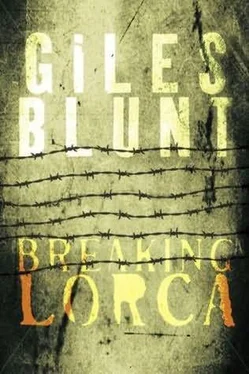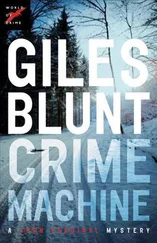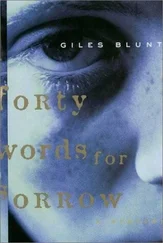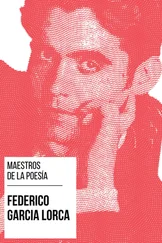Giles Blunt - Breaking Lorca
Здесь есть возможность читать онлайн «Giles Blunt - Breaking Lorca» весь текст электронной книги совершенно бесплатно (целиком полную версию без сокращений). В некоторых случаях можно слушать аудио, скачать через торрент в формате fb2 и присутствует краткое содержание. Жанр: Триллер, на английском языке. Описание произведения, (предисловие) а так же отзывы посетителей доступны на портале библиотеки ЛибКат.
- Название:Breaking Lorca
- Автор:
- Жанр:
- Год:неизвестен
- ISBN:нет данных
- Рейтинг книги:4 / 5. Голосов: 1
-
Избранное:Добавить в избранное
- Отзывы:
-
Ваша оценка:
- 80
- 1
- 2
- 3
- 4
- 5
Breaking Lorca: краткое содержание, описание и аннотация
Предлагаем к чтению аннотацию, описание, краткое содержание или предисловие (зависит от того, что написал сам автор книги «Breaking Lorca»). Если вы не нашли необходимую информацию о книге — напишите в комментариях, мы постараемся отыскать её.
Breaking Lorca — читать онлайн бесплатно полную книгу (весь текст) целиком
Ниже представлен текст книги, разбитый по страницам. Система сохранения места последней прочитанной страницы, позволяет с удобством читать онлайн бесплатно книгу «Breaking Lorca», без необходимости каждый раз заново искать на чём Вы остановились. Поставьте закладку, и сможете в любой момент перейти на страницу, на которой закончили чтение.
Интервал:
Закладка:
The Captain crossed the room to the door, and the four pairs of brown eyes followed him.
“It’s one o’clock,” he said. “Bring in Labredo.”
THREE
Only two months previously, Victor had been in a jail rather than guarding one. Being from a military family and having a high school diploma had made him prime officer material when he enlisted. And as Lieutenant Pena, he had several good months under his belt, running supplies along a coastal route considered only medium risk. Then one night, in a stunningly swift and brutal raid, the guerrillas slaughtered more than half the men in his command.
His sergeant had turned to yell something when his head exploded. Blood and brain matter blew into Victor’s face. He fell choking into a pit slick with blood, firing blindly into the trees, and surely would have been killed with all his men had it not been for the purely accidental arrival of a helicopter gunship thrown off course by faulty electronics. The pilot had plucked Victor and his remaining men to safety.
Victor had posted three guards, the right number by the book, but “clearly insufficient for conditions,” his superiors decided. Thus Lieutenant Pena was busted down to corporal. And that was not the end of his humiliation.
That night, that raid, undid him. Terror-at least in the field-became his mode of existence. The mere sound of automatic gunfire made him want to cry. And when, six months later, it came time to overrun a northern village suspected of harbouring rebels, Victor managed to charge smack into a guy wire, and spent the rest of the manoeuvre in a sheltering ditch, bleeding from a scalp wound. The resulting court martial sentenced him to death by firing squad.
His cell in the military jail had been much better than those in the little school, and he had not been abused by anyone. No, his torment had been simply to count down the hours to his certain death. After his sentence was pronounced, he had ten days to appeal, which was a joke, because in wartime there was no court of appeal. Victor wanted desperately to sleep through those ten days, but found he could not manage more than three or four hours a night, and even those were racked by savage dreams. His waking hours were consumed by an endless inner movie, rich with close-ups, of his own execution.
He had heard stories about firing squads. The worst was that all five men, none wanting to be the one to fire a lethal shot, would aim slightly away from the heart. The result, in more than one case, was that they blew off the condemned man’s arms.
Then, one damp, grey afternoon, his uncle, Captain Pena, had appeared before him like an angel of deliverance.
“You remember me, little Victor?”
“I remember you,” Victor said, staring at his uncle, who stood before him with a cowed-looking guard. “But you’re dead, I thought. They said you were killed in San Vicente.”
“So I was, as far as the press is concerned. That was just public relations. They had to lower my profile, so to speak, after all the noise about Sumpul.”
The Sumpul River had been the site of a massacre. Refugees had been driven by the Captain and his men toward the border with Honduras. The Honduran army had swept down with American helicopters and the refugees had been caught between the two forces. The army called it a great victory, announcing the death of six hundred rebels. But the American ambassador had made noises of discomfort when the bodies of women and children continued to wash up on the shores for weeks afterwards.
“Well, it looks like they’re going to kill me, uncle.”
“Lucky for you I came back from the dead. Casarossa said he wouldn’t protest if I removed you from his command and made you disappear. You’re the family shame, Victor. A blot on the name of Pena. But if you’re not ready to die just yet, you can come and work for me. One ghost working for another, eh?”
“You mean they’re not going to shoot me?”
“You’re coming with me-unless, of course, you’d rather die.”
Which was how Victor came to find himself cleaning up after the high-pressure interrogation of Labredo. He had asked about the howls of agony issuing from that room shortly after his arrival at the little school. He was informed that there was no torture, only high-pressure interrogation.
In his brief tenure in the army, Victor had seen his share of gore. Even before the ambush that had killed his men, there had been the mopping-up operations, sudden descents on villages and outposts where he had seen dead bodies and parts of bodies dangling from tree branches, heads still in their helmets gazing at the sky with empty sockets. He had seen mothers weeping over their dead children, the innards hanging out of the little corpses like torn curtains. He had seen soldiers with the tops of their heads blown off, bodies hidden under heaving coverlets of flies and maggots. These sights Victor got used to. He would have gone mad in the first week otherwise.
And then his sergeant’s brains had blown into his face.
He entered the former classroom with a mop and bucket and a few rags. He nearly choked on the smell of shit. He set down the bucket of soapy water and stared at the pool of blood congealing on the floor. It flowed out from a chair in the corner, colours fanning outward from bright crimson in the middle to rust brown at the fringes. The edges looked like a map of El Salvador’s coastline.
He swung his mop in wide, rhythmic circles as if he were a brain-damaged person who had learned to perform this one function and nothing else. He tried to order his brain not to focus on the elements in his field of vision, and not to put diverse elements together to make up a whole. He did not want to see the whole.
Tools were laid out on a table by the bricked-up window, simple household items: a hammer, a pair of pliers, a roll of tape. He tried not to connect the hammer or the pliers-both darkened with blood-to the screams he had heard that afternoon. And the teeth on the floor. The clumps of hair. He tried to see these bits of human as inanimate objects only, unconnected to each other, unconnected to the hammer and the pliers. I am a janitor, he told himself. At this moment I am a soldier under orders to clean up a mess. That’s all. I am not a philosopher, I am not a hero, I am no one’s saviour.
Certainly he was not poor Labredo’s saviour. Indeed, Sergeant Tito had ordered him to lead Labredo from the cells to this very room, the old man unresisting as a lamb. Now, Victor found one of Labredo’s eyeballs impaled on a yellow pencil, propped on a corner of the desk like a drumstick.
He kept trying not to put everything together. But as he mopped under the desk, he found Labredo’s other eyeball staring up at him in astonishment.
I led him here, Victor said to himself. I opened his cell and I led Labredo trembling, hardly able to walk, to an indescribable death.
He had brought Labredo, blindfolded-the prisoners were always blindfolded-out of his cell, the old man clinging to him as if he were his son. Victor had seen in his file that Labredo was not really an old man, he was only fifty-seven, but he had been in the little school for two months, and the photograph stapled to his dossier showed that he had looked very different when he had arrived.
After Victor had delivered Labredo into Sergeant Tito’s hands, there had not been much noise the first half-hour, just the usual shouts and his uncle’s quieter voice. Then his uncle had come out, grim-faced, and disappeared into his office. That was when the screams had started. Like a baby’s cry, the human scream is meant to provoke sympathy and bring help. In the little school it brought laughter.
Victor hadn’t had the courage to intervene, or even to run. He feared the bullet in the back. He feared being wounded, maimed or paralyzed; he feared capture. He feared what Tito would do to him. He feared his own screams. And so he had sat with his hands folded on the table in front of him and tried to breathe normally. The Captain had forbidden him to read, but he could not have read anyway. Labredo was begging the soldiers to kill him.
Читать дальшеИнтервал:
Закладка:
Похожие книги на «Breaking Lorca»
Представляем Вашему вниманию похожие книги на «Breaking Lorca» списком для выбора. Мы отобрали схожую по названию и смыслу литературу в надежде предоставить читателям больше вариантов отыскать новые, интересные, ещё непрочитанные произведения.
Обсуждение, отзывы о книге «Breaking Lorca» и просто собственные мнения читателей. Оставьте ваши комментарии, напишите, что Вы думаете о произведении, его смысле или главных героях. Укажите что конкретно понравилось, а что нет, и почему Вы так считаете.












